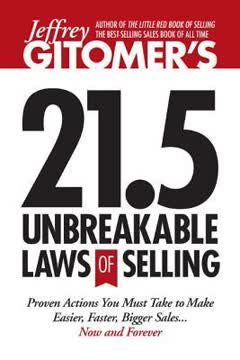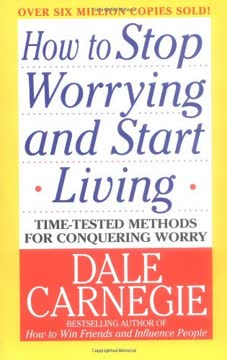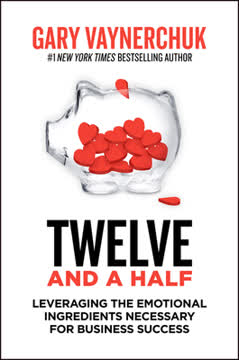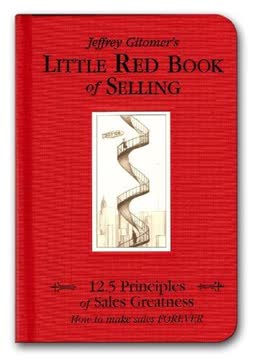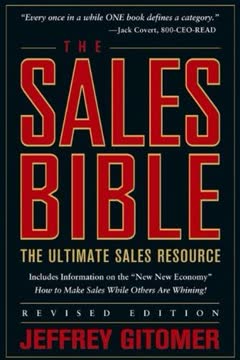Key Takeaways
1. Attract, Don't Chase: Become a Magnet for Willing Buyers
Enough value, put out consistently over time, means your phone will ring – with customers who want to buy.
The 95/5 Proposition. Gitomer highlights the stark contrast between attracting inbound inquiries and making unsolicited cold calls. When a prospect calls you, the odds of making a sale are around 95%. Conversely, cold calling results in a 95% rejection rate. This underscores the importance of shifting from a chasing to an attracting mindset.
Value-Driven Marketing. To attract willing buyers, focus on becoming a consistent value provider. This involves creating and sharing valuable content, building a strong reputation, and leveraging social media to broadcast your message. Instead of pushing sales messages, aim to pull customers in by offering insights, solutions, and helpful information.
Long-Term Strategy. Building a platform that attracts willing buyers takes time and effort. It requires consistent work, a clear value message, and a commitment to providing exceptional service. However, the long-term benefits of having a steady stream of inbound leads far outweigh the short-term gains of cold calling.
2. Think YES!: Cultivate an Unwavering Positive Attitude
Attitude controls, rules, affects, and directs your career, your family life, your personal life, and you.
Attitude is Everything. Gitomer emphasizes that a positive attitude is fundamental to success in sales and in life. It affects your relationships, your business outcomes, and even your health. A "YES! Attitude" goes beyond simply being positive; it's about embracing possibilities and believing in your ability to overcome challenges.
Consistency is Key. Maintaining a positive attitude requires conscious effort and self-discipline. It's not enough to be positive some of the time; you must cultivate a consistent, unwavering mindset. This involves focusing on solutions, reframing negative thoughts, and surrounding yourself with positive influences.
Transferable Enthusiasm. A positive attitude is contagious. When you approach your work with passion and enthusiasm, you can transfer that energy to your customers, creating a buying atmosphere. This makes them feel great and sets the stage for a successful sales interaction.
3. Believe Before You Succeed: Let Belief Fuel Your Sales
Your beliefs control your sales performance.
Belief as the Foundation. Gitomer asserts that your belief system is the fulcrum point of sales success. This includes believing in your company, your products, your ability to communicate value, and your ability to differentiate yourself from the competition. Deep, heartfelt belief is essential for conveying conviction and inspiring trust in your customers.
The 5.5 Elements of Belief. To be a master believer, you must:
- Believe you work for the greatest company in the world.
- Believe your products and services are the greatest in the world.
- Believe in yourself.
- Believe in your ability to differentiate from your competition.
- Believe that the customer is better off having purchased from you.
- Control your belief with your thoughts and attitude.
Overcoming Negative Beliefs. Negative beliefs, such as thinking your prices are too high or that the competition has a lock on the business, can limit your success. By strengthening your core beliefs and maintaining a positive attitude, you can minimize the impact of these limiting thoughts.
4. Employ Humor: Lighten the Mood and Open Doors
Laughter leads to listening.
Humor as a Communication Tool. Gitomer advocates for the strategic use of humor in sales. Humor can break the ice, create rapport, and make you more likeable. It also increases the likelihood that your message will be heard and remembered.
Appropriate Use of Humor. It's important to use humor judiciously and avoid jokes that could be offensive or inappropriate. Self-deprecating humor and funny stories are generally safe bets. The goal is to create a friendly, relaxed atmosphere, not to become a stand-up comedian.
The Listening Environment. Laughter creates the highest listening environment. When people are laughing, they are more receptive to your message and more likely to engage with you. This can lead to a deeper understanding and a greater willingness to buy.
5. Build Your Own Brand: Stand Out from the Crowd
In sales it’s not who you know; in sales it’s who knows you.
Personal Branding Imperative. In today's marketplace, building your own brand is essential for success. This involves creating a unique identity, establishing a strong online presence, and cultivating a positive reputation. Your personal brand precedes you and sets the tone for your interactions with customers.
Beyond the Resume. A resume is no longer sufficient. Potential employers and customers will Google you to find out more about who you are as a person. This means having a professional website, a strong social media presence, and a track record of providing value.
The "Be's" of Branding. To build a successful brand, focus on being likeable, believable, available, attractive, friendly, service-oriented, first-class, consistent, reputable, desirable, trustworthy, top quality, easy to do business with, and "buzzable." These qualities will help you stand out from the competition and attract customers.
6. Earn Reputation: Let Your Actions Speak Louder Than Words
Your reputation precedes you.
Reputation as a Foundation. Gitomer emphasizes that your reputation is the foundation upon which your brand is built. It's what people say about you, your company, and your products. A positive reputation can open doors and create opportunities, while a negative reputation can destroy your chances of success.
Building and Preserving Reputation. Building a strong reputation takes time and consistent effort. It involves doing what you say you will do, providing exceptional service, and acting with integrity. Once you've earned a good reputation, it's crucial to guard it and protect it from damage.
Social Media's Impact. Social media has amplified the importance of reputation. Customers can now easily share their experiences with your company, both positive and negative. This means that it's more important than ever to monitor your online reputation and address any issues promptly.
7. Be Assertive and Persistent: Strike the Right Balance
Assertive is the best strategy for engaging, establishing control, proving value, creating a buying atmosphere, and forging a relationship.
Assertiveness vs. Aggression. Gitomer distinguishes between being assertive and being aggressive. Assertiveness involves confidently expressing your needs and opinions while respecting the needs and opinions of others. Aggression, on the other hand, involves being pushy and disregarding the other person's perspective.
The Assertive Equation. Assertiveness stems from belief, a positive attitude, thorough preparation, and a commitment to providing value. When you possess these qualities, you can confidently engage with customers, establish control of the sales process, and create a buying atmosphere.
Persistent Follow-Up. Persistent follow-up is essential for closing deals, but it must be done with permission and respect. Ask your customers how they prefer to be contacted and what type of information they find valuable. This will help you stay top of mind without being annoying.
8. Demonstrate Excellence: Set the Standard, Don't Just Meet It
It’s not being best – it’s setting the standard.
Excellence as a Differentiator. In a competitive marketplace, demonstrating excellence is essential for standing out from the crowd. This involves consistently striving to improve, exceeding customer expectations, and setting the standard for quality and service.
Personal and Business Excellence. Excellence applies to both your personal and professional life. It's about being the best version of yourself and consistently delivering exceptional results. This requires a commitment to continuous learning, self-improvement, and ethical behavior.
The Customer's Perception. Ultimately, excellence is in the eye of the beholder. It's not enough to believe that you're excellent; your customers must also perceive you as such. This means consistently delivering value, exceeding expectations, and building strong relationships.
9. Deliver Value First: Give Before You Take
I put myself in front of people that can say yes to me, and I deliver value first.
Value as the Foundation. Gitomer emphasizes that delivering value first is the key to building trust and attracting customers. This involves providing helpful information, offering solutions to their problems, and demonstrating a genuine interest in their success.
Beyond "Added Value." Avoid using the term "added value," which often refers to minor services or extras that customers already expect. Instead, focus on providing real, tangible value that addresses their core needs and helps them achieve their goals.
The Value Proposition. A strong value proposition clearly explains how you help customers, how they win, and how you serve them. It focuses on the benefits they receive, not just the features of your product or service.
10. Communicate in Terms of Them: Focus on the Customer's Needs
You have to know their industry – not just your product.
Customer-Centric Communication. Gitomer stresses the importance of communicating in terms of the customer's needs and desires. This involves understanding their business, their challenges, and their goals. Instead of focusing on your own products and services, focus on how you can help them achieve their objectives.
The "Drill or Hole" Analogy. Customers don't buy products; they buy solutions to their problems. Instead of selling a drill, focus on selling the hole that the customer needs. This means understanding their desired outcome and tailoring your message accordingly.
Beyond the Product. To effectively communicate in terms of the customer, you must know their industry, their business, their marketing, their productivity, and their profit. This requires doing your homework and understanding their world.
11. Ask Before You Tell: Uncover Needs Through Powerful Questions
Questions are the heart of the sale.
Questions as a Sales Tool. Gitomer emphasizes that asking questions is more effective than telling. Questions uncover facts, needs, motives, and emotions, leading you to a sale faster than any sales pitch. The key is to ask powerful, emotionally engaging questions that get the customer thinking.
Emotion-Based Questions. Instead of focusing on logic-based questions that qualify the buyer, ask emotion-based questions that explore their life, their goals, and their desires. This helps you understand their true motives and connect with them on a deeper level.
Finding the Pleasure, Not the Pain. Avoid asking negative questions that "find the pain." Instead, focus on finding the pleasure, the purpose, and the expected outcome. This creates a positive atmosphere and encourages the customer to open up.
12. Serve Memorably: Create Lasting Impressions
To Serve Is to Rule.
Service as a Competitive Advantage. In today's marketplace, exceptional service is a key differentiator. It's not enough to simply satisfy customers; you must create memorable experiences that exceed their expectations and build loyalty.
The Elements of Memorable Service. Memorable service involves being friendly, proactive, and remarkable. It means going the extra mile, providing consistent help, and finding ways to surprise and delight your customers.
The Customer's Perspective. Ultimately, service is about the customer's experience. It's about making them feel valued, understood, and appreciated. When you consistently provide exceptional service, you create a reputation that attracts new customers and keeps existing ones coming back.
Last updated:
FAQ
What is "Jeffrey Gitomer's 21.5 Unbreakable Laws of Selling" about?
- Foundational Sales Laws: The book presents 21.5 core, "unbreakable" laws that Gitomer claims are essential for sales success, regardless of changing sales tactics or market conditions.
- Action-Oriented Advice: Each law is paired with actionable strategies, real-world examples, and implementation tips to help salespeople make more sales, faster and easier.
- Focus on Mindset and Behavior: The book emphasizes the importance of attitude, belief, reputation, and personal branding as much as sales techniques.
- Long-Term Success: Gitomer’s approach is about building a sustainable, relationship-driven sales career, not just hitting short-term quotas.
Why should I read "Jeffrey Gitomer's 21.5 Unbreakable Laws of Selling"?
- Timeless Principles: The book distills decades of sales experience into laws that remain relevant even as sales tools and technologies evolve.
- Practical, No-Nonsense Style: Gitomer’s writing is direct, humorous, and filled with real-life anecdotes, making the advice relatable and easy to apply.
- Comprehensive Coverage: It addresses not just how to sell, but how to build a reputation, brand, and loyal customer base.
- For All Sales Levels: Whether you’re new to sales or a seasoned pro, the book offers insights that can elevate your results and mindset.
What are the key takeaways from "Jeffrey Gitomer's 21.5 Unbreakable Laws of Selling"?
- Value Over Price: Focus on delivering and communicating value first, rather than competing on price.
- Personal Branding Matters: Your reputation and personal brand are as important as your product or company.
- Relationships Drive Sales: Building trust, loyalty, and memorable service leads to repeat business and referrals.
- Attitude and Belief: A positive, “YES!” attitude and deep belief in yourself, your company, and your product are foundational to success.
- Action and Consistency: Mastery comes from consistent, right actions—self-discipline and follow-through are non-negotiable.
How does Jeffrey Gitomer define the "Unbreakable Laws" of selling?
- Laws vs. Rules: Gitomer distinguishes between "rules," which can change, and "laws," which are fundamental truths that cannot be broken without negative consequences.
- Self-Evident Truths: The laws are based on universal sales principles that underpin all successful selling, regardless of industry or era.
- Consequences for Breaking: Each law includes a discussion of what happens if you break it, emphasizing that ignoring these laws leads to lost sales and poor reputation.
- Foundation for Growth: Mastering these laws provides a concrete foundation for long-term sales and career success.
What is the "95/95 Proposition" in "Jeffrey Gitomer's 21.5 Unbreakable Laws of Selling"?
- Inbound vs. Outbound: Gitomer explains that when a customer calls you (inbound), you have a 95% chance of making a sale; when you cold call (outbound), you face a 95% rejection rate.
- Value Attraction: The key is to become a consistent value provider so that customers seek you out, rather than you chasing them.
- Cold Calling Critique: He argues that cold calling is outdated and ineffective compared to strategies that attract willing buyers.
- Long-Term Strategy: Building a platform of value, reputation, and referrals is a process that pays off with easier, more frequent sales.
How does "Jeffrey Gitomer's 21.5 Unbreakable Laws of Selling" address attitude and belief in sales?
- YES! Attitude: Gitomer stresses the importance of maintaining a positive, enthusiastic attitude, which is both contagious and foundational to sales success.
- Belief System: He outlines 5.5 elements of belief: belief in your company, product, self, differentiation, and that the customer is better off buying from you.
- Transferable Passion: Your attitude and belief must be strong enough to transfer to the customer, creating trust and a buying atmosphere.
- Self-Reflection: The book encourages regular self-assessment to strengthen attitude and belief, as these drive actions and outcomes.
What role does personal branding and reputation play in "Jeffrey Gitomer's 21.5 Unbreakable Laws of Selling"?
- Brand Precedes You: Gitomer asserts that your personal brand and reputation arrive before you do, influencing customer perceptions and decisions.
- Online Presence: In the digital age, your Google results, social media, and online testimonials are critical components of your brand.
- Consistency and Value: Building a brand requires consistent value delivery, proactive communication, and memorable service.
- Reputation as Currency: A strong reputation leads to unsolicited opportunities, referrals, and long-term business security.
What is Gitomer’s advice on building customer loyalty and trust in "21.5 Unbreakable Laws of Selling"?
- Loyalty Over Satisfaction: The book argues that customer satisfaction is not enough; true business success comes from earning loyalty.
- Proactive Service: Memorable, proactive service (like Amazon’s unprompted refunds) creates WOW moments that drive loyalty and referrals.
- Trust as a Foundation: Trust is built through consistent, truthful actions and is the fulcrum of all successful sales relationships.
- Exchange of Value: Loyalty and trust are earned by consistently delivering value, keeping promises, and putting the customer’s interests first.
How does "Jeffrey Gitomer's 21.5 Unbreakable Laws of Selling" recommend using customer testimonials and social proof?
- Voice of the Customer: Testimonials, especially in video format, are the most powerful sales tool, providing proof and peace of mind to prospects.
- Proof Over Claims: Letting customers speak for you is more persuasive than any sales pitch; it authenticates your value and overcomes objections.
- Integration in Sales: Gitomer suggests incorporating testimonials throughout your sales process, presentations, and online presence.
- Earning Testimonials: The best testimonials are earned through exceptional service and outcomes, not by asking prematurely.
What are some of the most actionable strategies from "Jeffrey Gitomer's 21.5 Unbreakable Laws of Selling"?
- Deliver Value First: Always provide value before asking for the sale; this differentiates you and builds trust.
- Ask Emotionally Engaging Questions: Move beyond logic-based qualifying to questions that uncover emotional motives and desired outcomes.
- Serve Memorably: Go beyond polite service to create memorable, share-worthy experiences for customers.
- Be Assertive and Persistent: Assertiveness, rooted in belief and preparation, combined with creative, value-based persistence, leads to more sales.
What are the best quotes from "Jeffrey Gitomer's 21.5 Unbreakable Laws of Selling" and what do they mean?
- “You don’t have to play by the rules to win at sales, but you do have to follow and implement the laws.” – Emphasizes that while tactics can vary, foundational principles are non-negotiable.
- “If you want things to get better, you have to get better.” – Personal growth and self-improvement are prerequisites for sales success.
- “People don’t like to be sold, but they love to buy.” – Focus on creating a buying atmosphere rather than pushing for a sale.
- “If the customer perceives no difference between you and the competition, all that’s left is price.” – Differentiation and value are essential to avoid price wars.
- “Don’t close the sale. Complete the sales process, earn the sale, and begin the relationship.” – Shifts the focus from closing techniques to earning trust and building long-term relationships.
What is the significance of the "21.5th Law: Love It or Leave It" in "Jeffrey Gitomer's 21.5 Unbreakable Laws of Selling"?
- Passion is Essential: The final “half law” stresses that loving what you do is non-negotiable for sustained success and fulfillment in sales.
- Self-Assessment: Gitomer encourages readers to honestly evaluate their passion for their job, company, and product.
- Burnout vs. Fulfillment: Lack of love leads to burnout, mediocrity, and low performance; passion fuels excellence and resilience.
- Life and Career Planning: If you don’t love what you do, make a plan to transition to something you do love—success follows passion and belief.
Review Summary
Jeffrey Gitomer's 21.5 Unbreakable Laws of Selling receives mostly positive reviews, with an average rating of 4.05 out of 5. Readers appreciate the practical sales strategies and insights, finding them applicable beyond traditional sales roles. Some critics note repetition from Gitomer's previous works and a lack of early engagement. The book is praised for its systematic approach, motivational content, and relevance to personal and professional growth. Several reviewers recommend applying the tips incrementally and tracking progress for best results.
Similar Books
Download PDF
Download EPUB
.epub digital book format is ideal for reading ebooks on phones, tablets, and e-readers.
